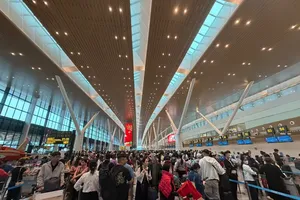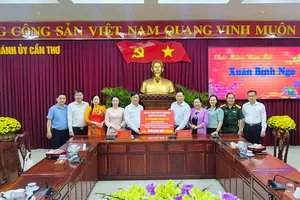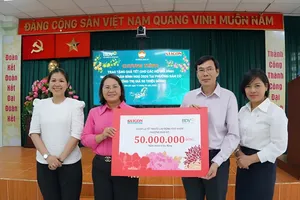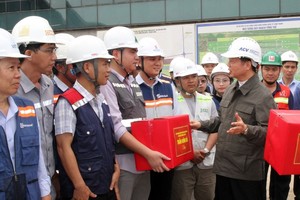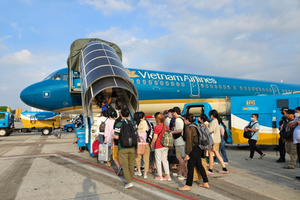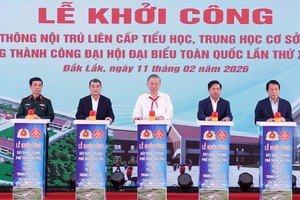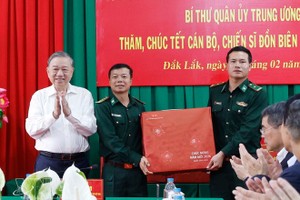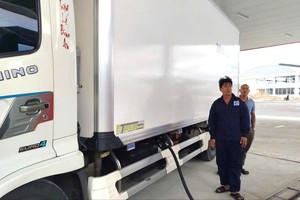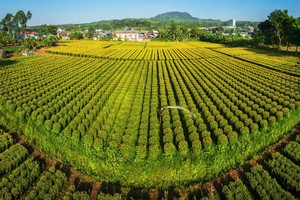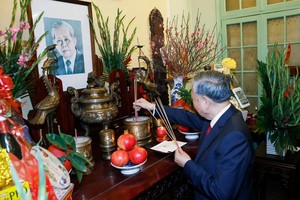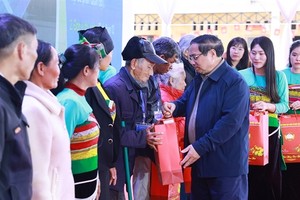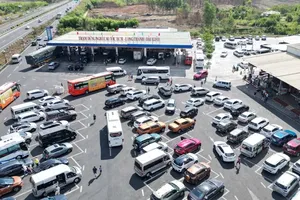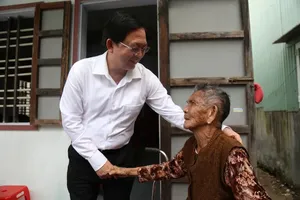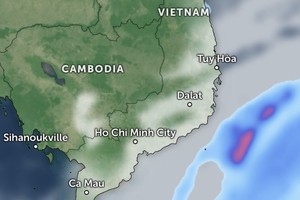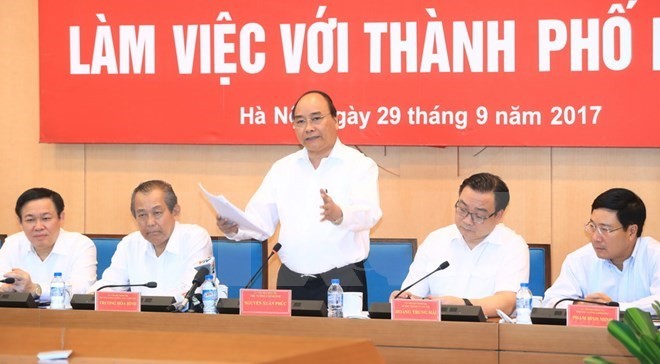
The PM hailed the city for improved business climate and administrative reform, and for leading in the new rural development campaign. The rate of poor households in the city has been reduced to 1.7 percent. It also leads the country in human development index in culture, school education, health care and sports.
He also spoke highly of many innovative ideas and the successful application of scientific and technological advances in management of the capital city.
According to the PM, the biggest challenge for Hanoi is how to manage a mega urban area, along with those relating to production model transform, workforce training, technological application, resources for infrastructure development, and public services. He particularly singled out the problem in urban construction in the city.
Suggesting several action plans, the PM stressed the need for Hanoi to work closely with neighbouring localities to minimise policy overlapping and fully tapping land resources, while continuing to enhance the management capacity of the contingent of public servants in combination with corruption prevention.
He required Hanoi to continue to work to meet criteria for a city of peace, especially those regarding social and residential community, and maintain its status as a cultural city representing Vietnamese culture.
At the same time, Hanoi should push forward with building a transparent and equal business environment, putting the citizens and enterprises at the centre of its services, PM Phuc said, urging the municipal authorities to continue pooling public resources, especially from the private economic sector, to raise capital for infrastructure works such as metro lines.
In his opinion, it is necessary to issue a decentralisation mechanism for the city in line with the law.
The PM recommended that the city relocate universities, businesses, hospitals out of the inner area to ease traffic jams, which have become a pressing issue for local residents.
Regarding the problem, Deputy Prime Minister Trinh Dinh Dung suggested Hanoi reduce population in inner areas through building high-quality urban areas in the suburbs and accelerating the progress of urban railway routes to ease traffic congestion.
Deputy Prime Minister Truong Hoa Binh called for issuing a special mechanism for Hanoi to enable the capital city to develop more rapidly.
Expressing impression over the rearrangement of Hanoi public administrative apparatus, Deputy Prime Minister Vuong Dinh Hue agreed with the city’s proposals and urged all possible policy support to Hanoi and amendments to the Law on the Capital City.
Chairman of the municipal People’s Committee Nguyen Duc Chung reported at the meeting that the city collected 146.4 trillion VND (6.36 billion USD) for the State budget in the first nine months this year, or 71.5 percent of the estimate and up 16.2 percent annually.
The city attracted 398 foreign-invested projects with a registered capital of 2.16 billion USD, 22 others in public-private partnership worth an estimated 60 trillion VND in the period. At the same time, the city recorded 18,685 newly-established firms, up 10 percent year-on-year, raising the total number of operating businesses to 225,700.
Hanoi ranked third among 63 cities and provinces nationwide in terms of the public administration reform (PAR) index, up 6 places from 2015, and was placed second in terms of readiness for technological application. The rate of business registration online hit 96 percent while tax e-filing and electronic customs procedures reached 98 percent and 100 percent, respectively.
However, rampant violations of construction and land use rules along with serious traffic congestion are among major causes of public concern.
He also spoke highly of many innovative ideas and the successful application of scientific and technological advances in management of the capital city.
According to the PM, the biggest challenge for Hanoi is how to manage a mega urban area, along with those relating to production model transform, workforce training, technological application, resources for infrastructure development, and public services. He particularly singled out the problem in urban construction in the city.
Suggesting several action plans, the PM stressed the need for Hanoi to work closely with neighbouring localities to minimise policy overlapping and fully tapping land resources, while continuing to enhance the management capacity of the contingent of public servants in combination with corruption prevention.
He required Hanoi to continue to work to meet criteria for a city of peace, especially those regarding social and residential community, and maintain its status as a cultural city representing Vietnamese culture.
At the same time, Hanoi should push forward with building a transparent and equal business environment, putting the citizens and enterprises at the centre of its services, PM Phuc said, urging the municipal authorities to continue pooling public resources, especially from the private economic sector, to raise capital for infrastructure works such as metro lines.
In his opinion, it is necessary to issue a decentralisation mechanism for the city in line with the law.
The PM recommended that the city relocate universities, businesses, hospitals out of the inner area to ease traffic jams, which have become a pressing issue for local residents.
Regarding the problem, Deputy Prime Minister Trinh Dinh Dung suggested Hanoi reduce population in inner areas through building high-quality urban areas in the suburbs and accelerating the progress of urban railway routes to ease traffic congestion.
Deputy Prime Minister Truong Hoa Binh called for issuing a special mechanism for Hanoi to enable the capital city to develop more rapidly.
Expressing impression over the rearrangement of Hanoi public administrative apparatus, Deputy Prime Minister Vuong Dinh Hue agreed with the city’s proposals and urged all possible policy support to Hanoi and amendments to the Law on the Capital City.
Chairman of the municipal People’s Committee Nguyen Duc Chung reported at the meeting that the city collected 146.4 trillion VND (6.36 billion USD) for the State budget in the first nine months this year, or 71.5 percent of the estimate and up 16.2 percent annually.
The city attracted 398 foreign-invested projects with a registered capital of 2.16 billion USD, 22 others in public-private partnership worth an estimated 60 trillion VND in the period. At the same time, the city recorded 18,685 newly-established firms, up 10 percent year-on-year, raising the total number of operating businesses to 225,700.
Hanoi ranked third among 63 cities and provinces nationwide in terms of the public administration reform (PAR) index, up 6 places from 2015, and was placed second in terms of readiness for technological application. The rate of business registration online hit 96 percent while tax e-filing and electronic customs procedures reached 98 percent and 100 percent, respectively.
However, rampant violations of construction and land use rules along with serious traffic congestion are among major causes of public concern.





